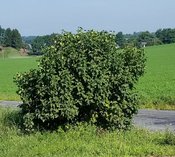My parents have a lilac bush that's pretty big. It's been infested by a colony of really big bees again this year - the smallest of the ones that have been killed are an inch long with the biggest being almost 2 1/2".
I think my mom is with the idea of removing it. I've seen lilac on here before and would love to take some of it, but questioned how to go about it and what to get. It's a pretty big bush, but I can't say for sure how thick the branches are as it's covered in leaves and really big bees at the moment.
It's probably 5-6 feet tall so I'm guessing there's a pretty nice ball of roots under it? I've never done any digging for a root ball but think this may have some potential, once those bees are gone. Any tips would be welcome.

I think my mom is with the idea of removing it. I've seen lilac on here before and would love to take some of it, but questioned how to go about it and what to get. It's a pretty big bush, but I can't say for sure how thick the branches are as it's covered in leaves and really big bees at the moment.
It's probably 5-6 feet tall so I'm guessing there's a pretty nice ball of roots under it? I've never done any digging for a root ball but think this may have some potential, once those bees are gone. Any tips would be welcome.








